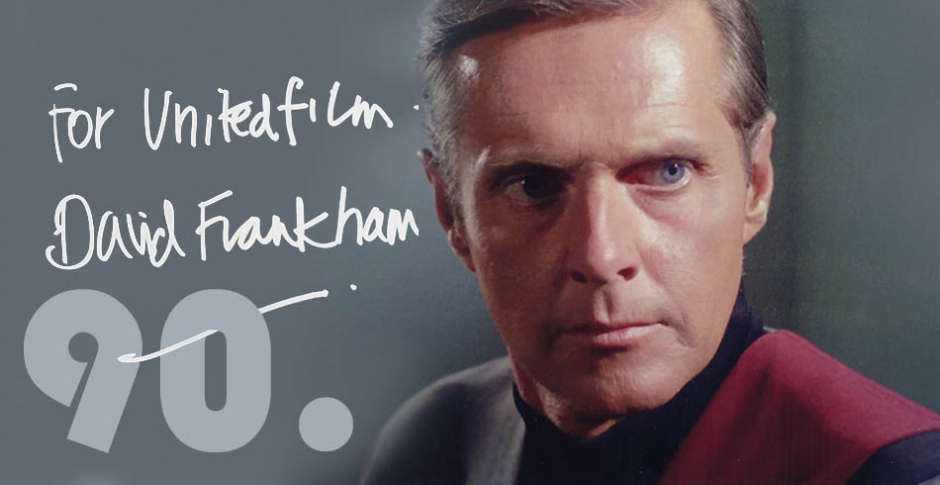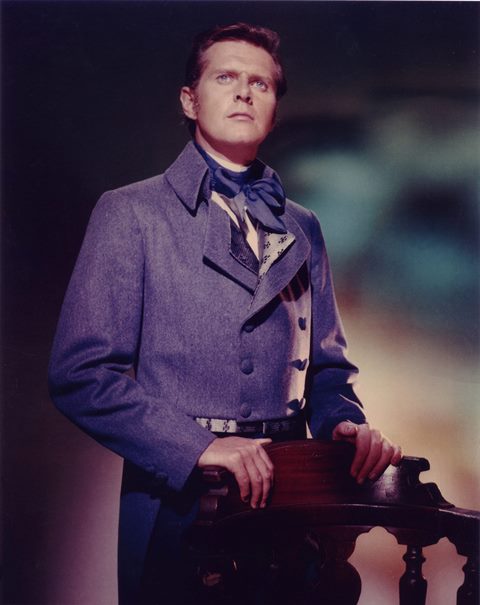David Frankham: I was at right time at the right place
Written by Eva Csölleová, Vítek FormánekEnglish actor David Frankham shows that one should follow his dreams. He did something that is impossible these days. In 1955 he decided to go to Hollywood to become and actor without actually having any acting experience and without knowing anybody there. Unlike many actors these days, he got a job very soon and befriended stars like Elizaberth Taylor, Dick Bogarde, Alec Guiness, Vincent Price or Rock Hudson who opened doors for him. He was busy in TV and didn´t refuse any movie so he was busy till his pension age. He appreared in films like King Rat, The Return of the Fly or Tales of Terror, not forgetting having worked in dubbing, notably in 101 Dalmatians movie. He was chuffed by Unitedfilm's interest in his career and was very honest and open. He celebrates 90th birthday in February so we wish him lots of health and peace.
What is your social background, what did your parents do and what did they want to have from you?
My mother was the daughter of a Scottish shepherd.She met my father when she joined the British Navy as a WRNS during World War I.My father was an Able Seaman in the British Navy, and eventually worked his way up to Warrant Officer.When I was growing up he was always away from home for two-year tours of duty, so I didn’t really get to know him until I was 14 years old, when he was finally based in England.
I was raised mostly in Kent, thirty miles south of London -- but during the air-raid bombings in WWII in 1940 my mother and I were sent to Scotland to live with her father and sister.I was an only child and I always wished I had brothers and sisters.My parents were NOT artistic or creative.I never felt that I fit in with my family.For example, I lovedmovies, but my father had to be dragged to the cinema.I was interested in the actors, but at the end of the movies when the closing credits started, he would get up and say,“I’m not sitting through all that muck!”
My parents were not supportive of my first wanting to be anactor when I was16.It was their choice that I had to study for a career as an architect-- a subject for which I had nointerest at all.I went to architectural school for twomiserable years… but fortunately the army then intervened and put a stop to that.When I later worked at the BBC my parents were thrilledbecause that was a respectable career that would lead to a secure pension and retirement.They were devastated when I gave it all up to try a career in Hollywood!
Even when I showed success in Hollywood, my mother and father had very little to say about it.In fact, my mother used to sigh and say, “It’s your life.”It just wasn’t a world they knew and they didn’t know how to relate to it.It was like I had moved to Mars.
Still, I later found out that they were more supportive thanthey let me know. My mother had been diagnosed with cancer in 1955, but she didn’t tell me and go in for surgery until afterI had moved to the U.S., because she thought it would keep me from leaving and following my dream.And after my father diedI discovered that he had saved all the photos I had sent himfrom my movies, and he had written notes on the back of them.
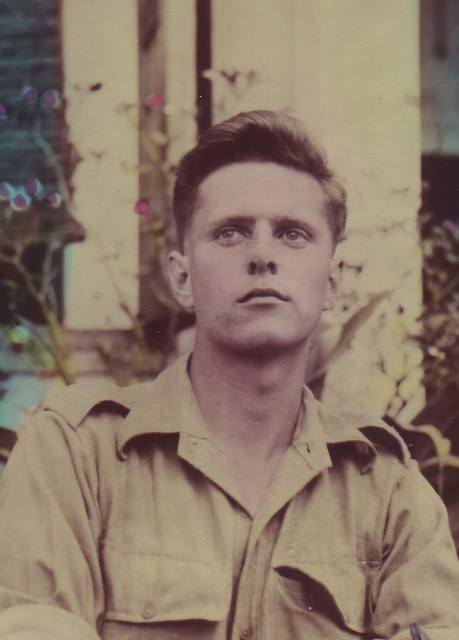
We read you served in WWII in Malaya and India.You must have been 18 at that time. What was your unit and were you in actual combat with Axis?Any special recollections about war action?
Fortunately for me I was drafted into the army after WWII wasended, so I saw no war-time activity.In fact, I regarded the next three years as a waste of my young life -- even though that turned out not to be true. I was sent to pre-independence India, where anti-British feeling was very high.
Our lives were constantly at risk.We British soldiers hadrocks thrown at our trucks whenever we left the safety of the Red Fort in Old Delhi. One event in the army changed the course of my life:On my 21st birthday in Kuala Lumpur in Malaya, I collapsed from typhus and almost died.Because of my illness I didn’t getsent away with the rest of my unit.I stayed in Kuala Lumpur and ran a drawing office manned by civilian Malayans.
While I was working there I entered a contest to host a radio program, to present my eight favorite records.I won thecontest, and to my surprise, right after the broadcast the station owner made me an offer to work at the station as a volunteer in the evenings.I loved working in radio and when I finally left the army and went back to England, the station owner gave me a letter of recommendation to the BBC.That led to my radio career for the next seven years -- which I had never dreamed I could really do for a living.
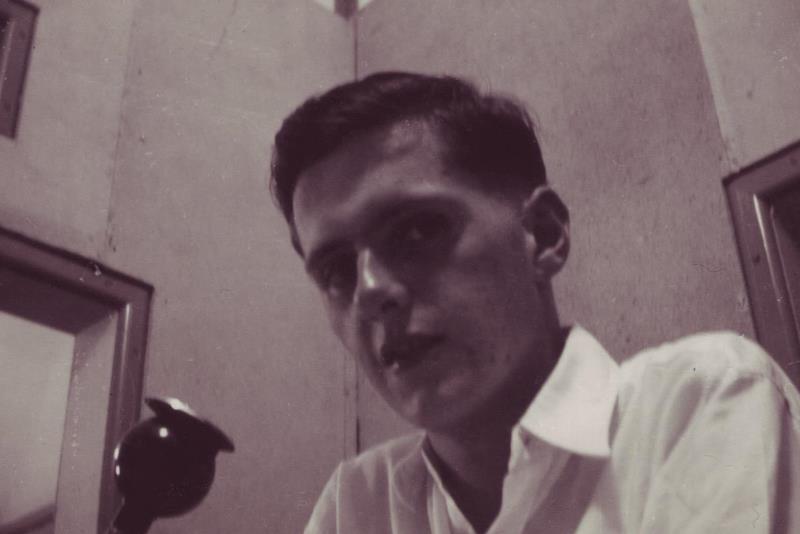 You worked for BBC between 1948-1955. Was acting something you dreamt about in the battlefield or it just fell in your way? Could you tell us how it worked in entertaining business in England up after the war till you left?
You worked for BBC between 1948-1955. Was acting something you dreamt about in the battlefield or it just fell in your way? Could you tell us how it worked in entertaining business in England up after the war till you left?
I wanted to be an actor from age16, after I saw Gladys Cooper in NOW, VOYAGER in1942.I knew for certain that I had to be an actor one day when I saw Laird Cregar’s mesmerizingperformance as Jack the Ripper in THE LODGER in1944.I remember staring at the screen thinking to myself,“I’ve got to do that one day.”
Because of the lack of support from my parents, though-- andbecause of being drafted into the army-- I had to put mydream of being an actor on hold for years.Luckily, my job asa BBC radio interviewer later put me in close contact with many Hollywood actors. I never let go of the thought of being an actor and it was those contacts that finally allowed me to take the risk of making my dream come true.Nobody encouraged me.My parents thought I was crazy, and my BBC colleagues thought I was crazy.
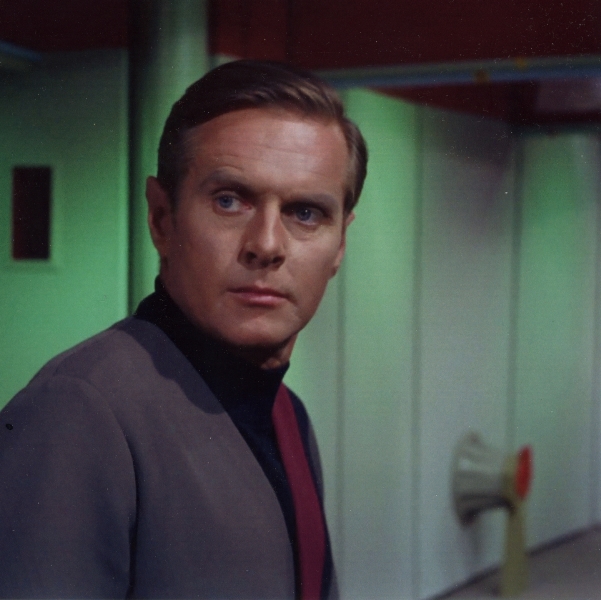 You made a bold decision to move to Hollywood in 1955 and got a job straight away. Amazing, wasn't it?Was it then as easy at it looks or have you had extraodinary luck?No waiters jobs in LA for would-be-actors then as it is now?
You made a bold decision to move to Hollywood in 1955 and got a job straight away. Amazing, wasn't it?Was it then as easy at it looks or have you had extraodinary luck?No waiters jobs in LA for would-be-actors then as it is now?
I had extraordinary luck.After doing a radio interview with the singer/actress Rosemary Clooney for the BBC, I asked her if she thought I could make a living in radio in Hollywood. Rosemary said the magic words: “I think you’d do fine. Here’s my secretary’s number at the studio.Call me when you get there.”It was as easy as that, and she was as good as her word.Shortly after my arrival in Hollywood I beganfreelancing in Los Angeles radio.Rosemary Clooney changed the course of my life.
I was too dumb to know how hard it is to break into acting.I just knew I had to try and I always believed it would happen. I figured I would work in radio, hopefully make contacts with film people, and then work my way up in acting, starting with a line here and there.
I had more extraordinary luck when I got my first acting job ever eight months after moving to Hollywood -- a lead role in a live television play, replacing Roddy McDowall (who had to leave suddenly for New York). I had many actor friends who were NOT as lucky as I was.They had to work in shops between their occasional acting jobs.
Even though some were VERY talented actors, they rarely gotauditions or roles; whereas after my initial appearance on NBC television, I was offered five more leading roles on live television in five months. Even though I was very focused and worked very hard... yes, I was definitely lucky.
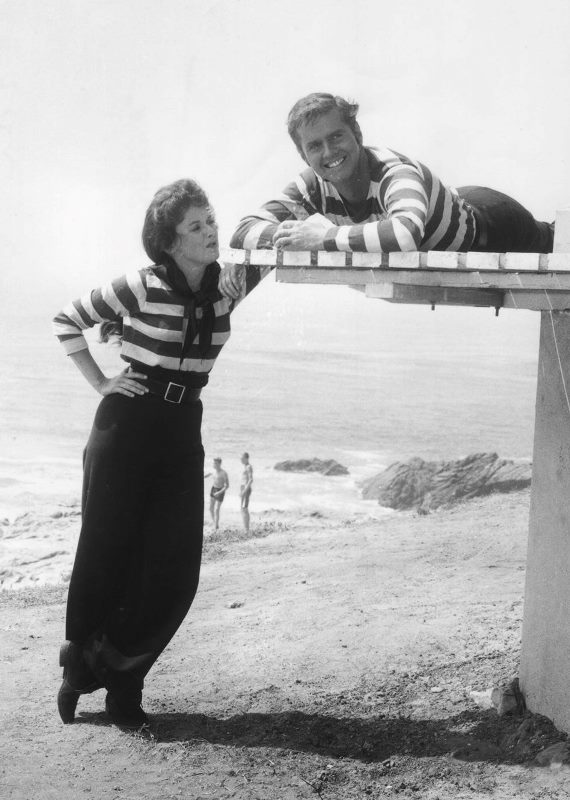 What was the Hollywood like at the time when you arrived there? Could you briefly tell how Hollywood changed with decades gone by?
What was the Hollywood like at the time when you arrived there? Could you briefly tell how Hollywood changed with decades gone by?
When I got to Hollywood in 1955 it was the last days of thestudio system, largely because of the rise of television inmillions of American homes.There were still some studiocontracts, which offered security to actors who had them-- I was still hoping for one myself in 1960 -- but even those were not being renewed.Even stars as good as my friend AngelaLansbury were being let go.Some actors and directors likedthe independence, but others had a hard time promotingthemselves as free-lancers.
Personally, I found that time exciting because there was still a chance to meet and work with legends and familiar faces from the Golden Age of movies:Stan Laurel, Boris Karloff, ClaudeRains, Fred Astaire, Edward Everett Horton, Ida Lupino, Thomas Mitchell, Doris Lloyd, Basil Rathbone, Peter Lorre, Vincent Price, Paul Henried, Lowell Gilmore, Gladys Cooper…To a movie fan like me, that was like dying and going to Heaven!
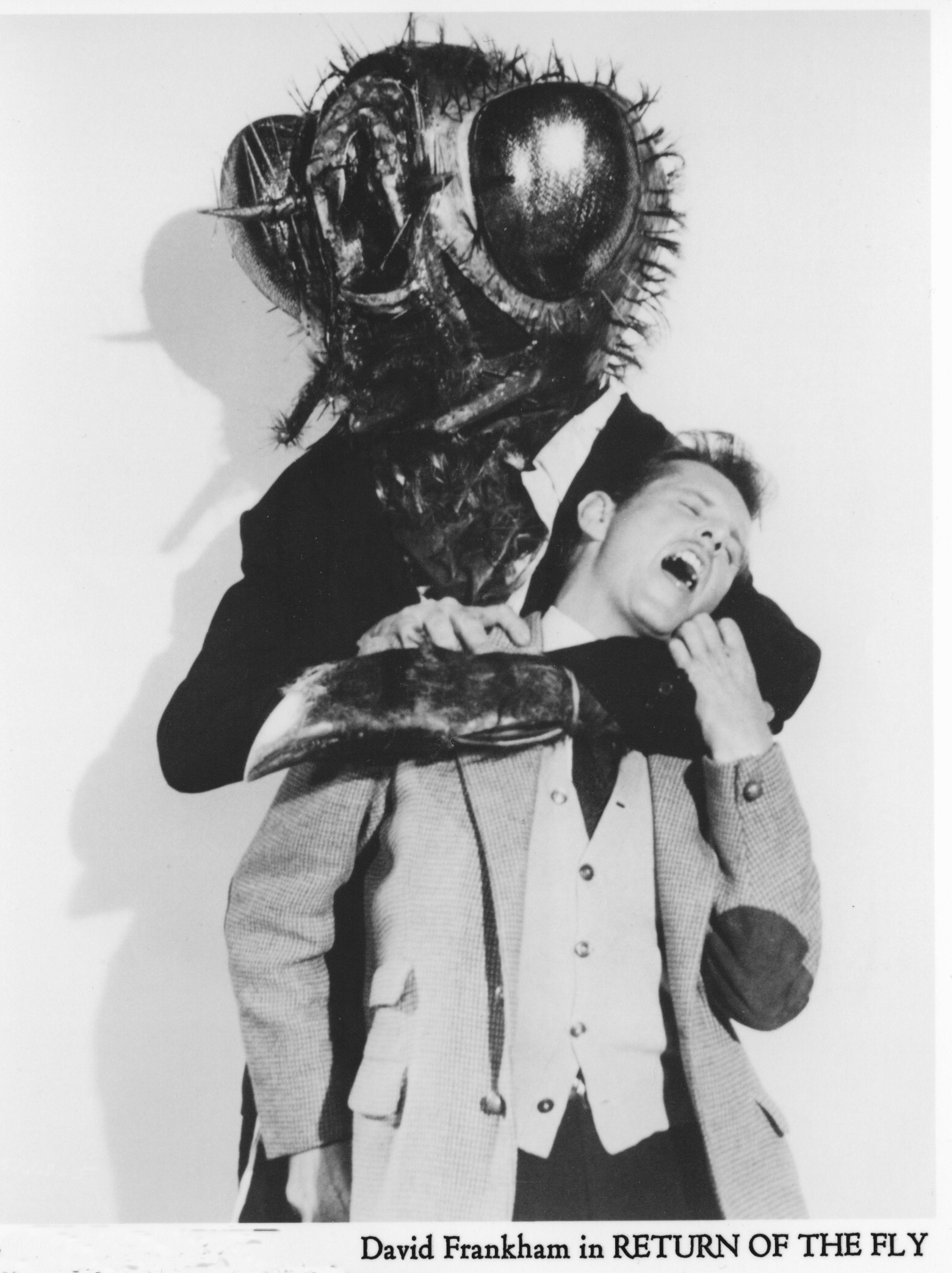 In the late 50´s some legendary sci-fi thrillers were made (they are still classic to watch these days).Was it just in vogue in those days or it was cold war orientated and Russians were disguised as Martians and invaders?
In the late 50´s some legendary sci-fi thrillers were made (they are still classic to watch these days).Was it just in vogue in those days or it was cold war orientated and Russians were disguised as Martians and invaders?
I think it must definitely have had something to do with the times-- with all the atomic monsters and feelings of anxiety around atomic bombs it is hard to deny that-- but I also think it was a passing fad.One studio had a hit with it, so others copied it.There were a lot of young people at the time because of the Baby Boom after the war, and that is what young people like.
Was there any board in Hollywood which would supervise and censor films from political point of view (e.g. too liberal, too non- American etc)? Did you actually witness any McCarthy´s actions and witch hunting against some actors, directors?
Yes, I saw some direct results of the McCarthy witch hunts and it was very sad.I got a personal insight into the damage caused by the actions of the House UnAmerican Activities Committee because of my friendship with the husband-and-wife team of Betty Garrett and Larry Parks.They both had flourishing careers-- in Larry’s case, with THE JOLSON STORY and JOLSON SINGS AGAIN in 1946.Betty had a huge hit in the 1949 musical ON THE TOWN.
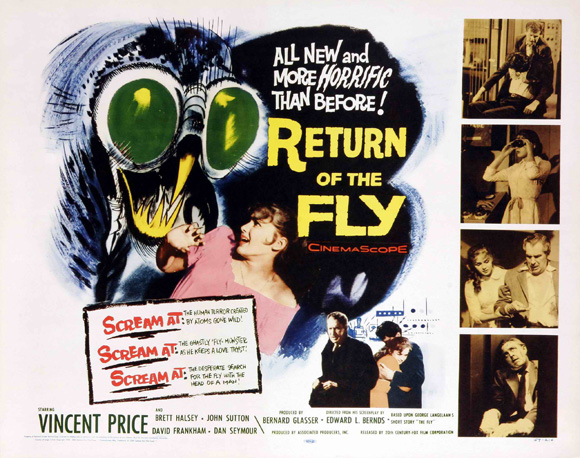 In1950 or1951 Larry was called to testify at a HUAC hearing and, under great pressure, he broke down and named names of people he had met, although neither he nor Betty had any communist tendencies themselves.
In1950 or1951 Larry was called to testify at a HUAC hearing and, under great pressure, he broke down and named names of people he had met, although neither he nor Betty had any communist tendencies themselves.
As a result, Larry’s Hollywood career was over the following morning.Larry was then appearing in an MGM comedy called LOVE IS BETTER THAN EVER with Elizabeth Taylor.The day after Larry’s break-down at the hearing, Louis B. Mayer, head of MGM, immediately withdrew the film, saying,“No Commie is going to appear opposite my biggest star!”Betty’s career slowed down soon after.
In1955, Betty and Larry had been guests on my BBC radio program in the U.K.--“The Bright Lights”-- and we became instant friends.When I arrived in Hollywood later that same year Betty and their boys welcomed me to a series of dinners in their home.Larry, unable to work in Hollywood, was touring Canada in a production of TEA HOUSE OF THE AUGUST MOON. He was only able to work outside the U.S.
Probably your most successful film was Tales of Terror. Why do you think it got such a status? Why in your view these days Hollywood make re-makes of 50´s films but in my mind they always flop badly.Vision of quick bucks or lack of good and original screenplays?
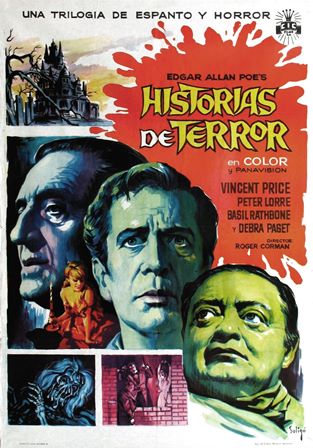 In the case of TALES OF TERROR, the answer seems to be the obvious one(that producers often miss):Even though it was a low-budget movie, it was very well made.It had a good, literate script (by Richard Matheson), and likeable stars with good chemistry doing good acting.
In the case of TALES OF TERROR, the answer seems to be the obvious one(that producers often miss):Even though it was a low-budget movie, it was very well made.It had a good, literate script (by Richard Matheson), and likeable stars with good chemistry doing good acting.
Having three30-minute stories, rather than one 90-minute story, the stories were tight and focused, so there was no padding. Vincent Price had his own built-in audience, after a string of successes for American International, and in this movie he got a chance to show his impressive range as an actor, playing three very different characters-- and especially so because he was supported by his old friends, the legends Peter Lorre and Basil Rathbone.
I think today studios try to play it safe.They remake old films because of only the recognition value of the title-- but they don’t really care beyond the title.All they care about is that the audience knows the name GODZILLA or THE DAY THE EARTH STOOD STILL, for example. They don’t really care about the stories of GODZILLA or THE DAY THE EARTH STOOD STILL, so when it comes time to make a movie to go along with the familiar title, they just run the stories through the same cliches and formulas. That lack of caring comes across to the audiences:If the people who made the films don’t care about the films, why should the audiences?
You also acted in famous film King Rat which was even showed in our country during communism. Could you tell me more about its filming, where was it, how long did it take to make, was it difficult in that humidity, any ex-POW´s supervisors on the scene?
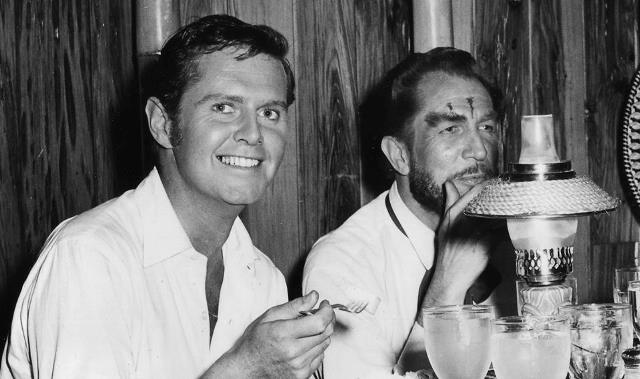 The casting director, Eddie Rhine, had previously cast me in a similar role in a television show where I had to emotionally fall apart.He knew I could do it, so he suggested me to the director of KING RAT, Brian Forbes.My scene had no dialogue.It was to be a purely emotional reaction and Brian Forbes said,“I can’t read you for the part because there are no words, but Eddie assures me you’re the actor for the job, so it’s yours if you want to do it.” I had the highest regard for Brian Forbes’ work with such films as WHISTLE DOWN THE WIND, so I had no hesitation in accepting the role.
The casting director, Eddie Rhine, had previously cast me in a similar role in a television show where I had to emotionally fall apart.He knew I could do it, so he suggested me to the director of KING RAT, Brian Forbes.My scene had no dialogue.It was to be a purely emotional reaction and Brian Forbes said,“I can’t read you for the part because there are no words, but Eddie assures me you’re the actor for the job, so it’s yours if you want to do it.” I had the highest regard for Brian Forbes’ work with such films as WHISTLE DOWN THE WIND, so I had no hesitation in accepting the role.
KING RAT was actually filmed in California, so there was no humidity!It was very dry.They had recreated the Changi prison camp in Singapore in the San Fernando Valley, outside of Los Angeles.By coincidence, in 1947 I was actually stationed with the British Army at the REAL Changi-- after the war and the defeat of the Japanese. (It was VERY humid there!)The replica in California was amazingly accurate in every detail.I knew the real place well, of course, so I could walk with Brian Forbes around the set and tell him how accurate it really was.
The filming period took place over several months.That worked out to my advantage.Initially, I had a three-week guarantee to be on the movie, based on the expected arrival of John Mills to play the scene with me.However, he was delayed while completing a film in England so my contract was extended for many, many weeks as we waited for John Mills to arrive.I was called to the filming locating every day for several weeks, but finally they told me to just wait at home for their phone call-- while still collecting my weekly salary!
John Mills finally arrived and my day came.I walked on to the set.Brian Forbes said,“We’re not going to rehearse you, David.Take your time and let me know when you’re ready.” With the entire cast and crew staring at me, I quickly and easily worked myself into a state of high anxiety and said,
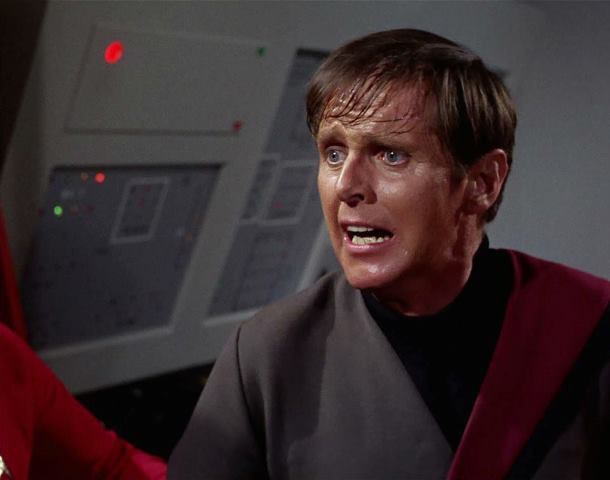 “I’m ready!”A couple of minutes later it was all over.I managed it in one take. I thought my part in the picture was over then… but that evening the studio called to say I would remain on salary until Christmas Eve, because Brian Forbes had decided to add another scene showing all the officers asleep in their beds at the beginning of the film.As a result, I was paid for several MORE weeks of sitting at home.For those two days of work I ended up being paid much, much more than for many leading roles!
“I’m ready!”A couple of minutes later it was all over.I managed it in one take. I thought my part in the picture was over then… but that evening the studio called to say I would remain on salary until Christmas Eve, because Brian Forbes had decided to add another scene showing all the officers asleep in their beds at the beginning of the film.As a result, I was paid for several MORE weeks of sitting at home.For those two days of work I ended up being paid much, much more than for many leading roles!
I didn’t know of any ex-POW supervisors on the set, but I’m sure Brian Forbes did his research ahead of time.The British actors living in Hollywood were told to look as starved and emaciated as possible, so in my case I lost 35 pounds for the role.Then the British actors from the U.K. arrived-- and they had not lost any weight at all!
Someone said that actor's job is ungrateful job 'cos you only wait for phone call to offer you a job.Did you ever feel independent as an actor or you always had to do what you were expected by someone who paid you?
I’m afraid a simple YES to all of that!It is frustrating to want to work, and to know you’re good and talented, but to be dependent on other people to let you do it -- to provide you with the opportunities; and especially when many of those people are, frankly, not very smart. (I can say this from the security of my own happy retirement.)Many casting directors and directors just aren’t very imaginative, and many don’t have a good sense of what is good acting or bad acting.
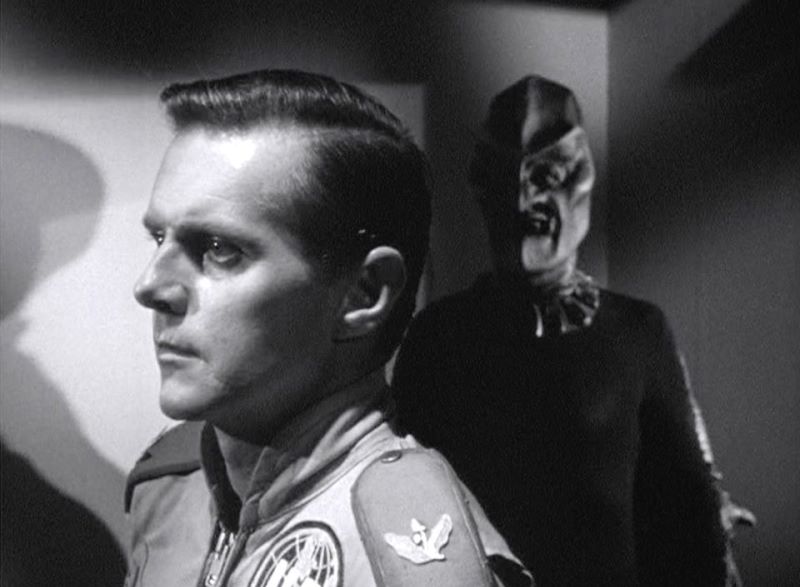 Sir Derek Jacobi said that actors are basically beggars -- even successful ones who make a living at it. That was definitely true in my time, and I’m sure it still holds true today. It is only the most successful star actors who have enough money and power to initiate their own projects, giving themselves the roles they want. I always say that I was just a “jobbing actor” … doing whatever work came my way, just like a plumber or house-painter.
Sir Derek Jacobi said that actors are basically beggars -- even successful ones who make a living at it. That was definitely true in my time, and I’m sure it still holds true today. It is only the most successful star actors who have enough money and power to initiate their own projects, giving themselves the roles they want. I always say that I was just a “jobbing actor” … doing whatever work came my way, just like a plumber or house-painter.
Now with film being filmed around the world by various big and small companies and not by big studios, do you think actors are more indepenent than they used to be or is it even worse than in old days?
I don’t think being an actor was ever easy, but in my opinion it is even harder now than in the old days because back then there was the “studio system.” That guaranteed -- at least in the mid-1950’s -- that most television shows coming from the big studios ran for 39 episodes every season, guaranteeing a steady stream of work for the much fewer number of actors. Back then there was usually only one month between the ending of filming a television season and the beginning of filming the next season.
There was also a great deal of security in the fact that all the major studios were still fully functioning, with both feature films and television series -- and that they were all located within a few miles of each other.
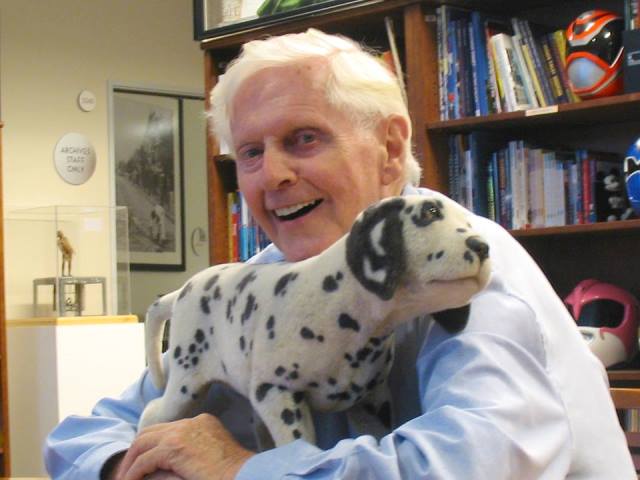 Even though it was more centralized then -- everything was done in Hollywood -- the advantage of that was, the business was much more personal. You got to know casting directors as friends and colleagues. They got to know you as a person because you regularly met with them face-to-face. Today, from what I see my young actor friends doing -- for example, Jonathan David Dixon, who is a very talented, excellent actor -- it is much more impersonal. It is all on computers and video. Because of that it is much more frustrating and difficult to make a personal impression. I also believe it must be much more challenging to actors today than it was in my time (between 1956 and 1988) just because there are so many more actors competing now.
Even though it was more centralized then -- everything was done in Hollywood -- the advantage of that was, the business was much more personal. You got to know casting directors as friends and colleagues. They got to know you as a person because you regularly met with them face-to-face. Today, from what I see my young actor friends doing -- for example, Jonathan David Dixon, who is a very talented, excellent actor -- it is much more impersonal. It is all on computers and video. Because of that it is much more frustrating and difficult to make a personal impression. I also believe it must be much more challenging to actors today than it was in my time (between 1956 and 1988) just because there are so many more actors competing now.
How do you view current technology, animation, 3D? Doesn´t it take away the art of real acting and actor is less and less important 'cos he can be created by a PC?
Fortunately the medium will always need actors, regardless of the technology used. From what I’ve seen of newer movies, I think the real danger is that studios believe that computer special effects alone are what audiences want to see. Because of that there is a foolish tendency to neglect writing good scripts, with interesting, believable characters and stories.
Thank you very much


